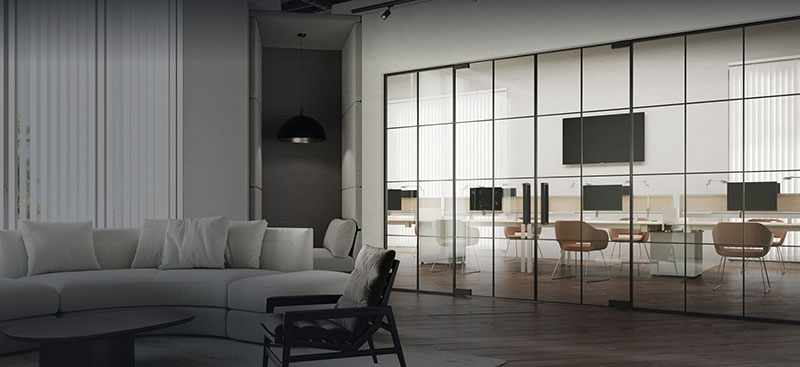Advertisement
Following the COVID-19 pandemic, office life will never be the same.
Even though 90% of companies expect their employees to return to offices by the end of 2024, remote work policies are likely to dominate our increasingly digital future.
While 25% of employees — mostly young and single people — are not opposed to ditching work from home for good, a quarter of the global workforce cites long commute times and a lack of a work-life balance as the key reason for keeping the remote work status quo.
As a result, many employers reconsider their approaches to office design to retain employees with sonically different attitudes.
In an attempt to turn offices into social hubs, improve productivity, and reduce office space costs, enterprises tap into various interior design techniques
Specifically, companies seek to maximize the use of natural light, create more private spaces, and frequently reorganize office layouts.
And here’s where office partition walls made of different types of glass come in handy.
In this article, we’ll delve into the glass divider advantages and essential considerations.
Top 3 Advantages of Utilizing Partitions in Modern Offices
- Utilizing office space more effectively. Unlike solid partitions and interior walls, which take up to 10% of all available space in homes and offices, glass dividers are thinner and easier to install and dismantle. They help quickly rearrange office layouts, separating large spaces into conference rooms, sound-proof cubicles, and recreation areas. This way, companies can make do with smaller offices while still maintaining privacy in open office environments.
- Minimizing distractions. Another reason why your employees might be reluctant to leave the comfort of their homes is dealing with distractions in the workplace. Up to 63% of your workforce feels distracted by your office environment. Given that it takes a person 23 minutes on average to restore focus after interruptions, it doesn’t come as a surprise that employees spend roughly 50% of an eight-hour working day doing actual work. Whether made of soundproof or regular glass, partitions reduce noise levels by up to 90%. This, in turn, improves concentration and makes your workers 40% more productive.
- Improving productivity. Keeping noise levels down is not the only way to improve employee outcomes. Other factors, such as the abundance of natural light, also help boost productivity, prevent fatigue and drowsiness, and reduce stress. And we have hard numbers to back up our claims. According to a study conducted by Professor Alan Hedge from Cornell College of Human Ecology, employees who work near windows that are designed to maximize natural light exposure are at least 2% more productive than their colleagues who work in areas with poor lighting. This is equivalent to more than $100,000 in additional productivity costs per 100 workers every year. Similarly, natural light stimulates serotonin production, helping alleviate the symptoms of seasonal affective disorder (SAD) and depression among your workforce. Made of transparent or opaque glass, portable office partitions improve lighting in office spaces, creating a dynamic and productive environment. As a bonus, glass dividers help save energy by minimizing the need for artificial lighting.
What to Keep in Mind When Installing Glass Walls for Offices
While glass dividers are a gift that keeps on giving, there are several things to consider when transforming your old dull office into a futuristic studio:
- Privacy can be a concern. Glass dividers surely foster a culture of openness and transparency (pun intended). Still, some employees might have a hard time working in full view. You can solve this problem by augmenting glass walls with decorative elements like blinds or curtains. Also, you can choose different types of glass, such as opaque or frosted, for areas where privacy is desirable.
- Safety issues. To prevent workplace accidents involving glass wall breakage, it is recommended you opt for tempered or laminated glass. These materials do not shutter explosively, breaking into small, dull pieces instead.
- Unforeseen expenses. Although glass walls are cheaper than solid partitions and do not require complex installation, customized dividers may turn out to be a considerable investment for your company. To plan your interior design budget wisely, discuss your project requirements with the glass wall vendor and evaluate different options.
- Professional installation and maintenance. Glass panels are typically mounted to the floor and adjacent walls using special fixtures, which makes them relatively easy to install. However, your company might still benefit from professional installation services to avoid potential issues, including safety hazards, reduced sound insulation, and poor temperature control. Furthermore, glass walls need regular maintenance, such as checks for wear and tear and cleaning with mild detergents and cloth.
Glass walls fulfill the two main requirements of a modern office, which are providing open collaboration spaces and private work areas.
However, businesses must weigh their benefits against practical considerations like privacy, safety, and cost.
By anticipating these issues and seeking advice from design experts, organizations can optimize the use of glass dividers while meeting their objectives.
This will result in workspaces that are not only aesthetically pleasing but also promote productivity and the well-being of employees, becoming your silent ally in luring remote work fans back to offices.

